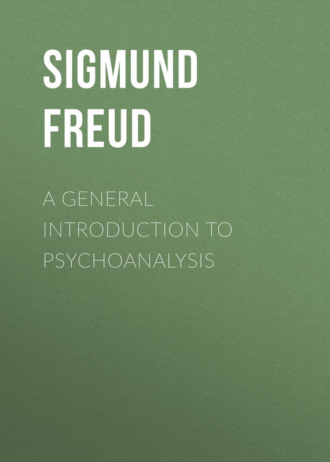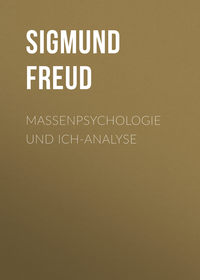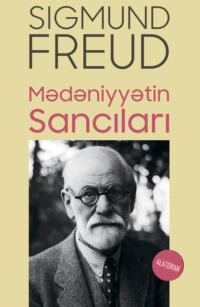 полная версия
полная версияA General Introduction to Psychoanalysis
Q.
Alas! Alas! and stands it so?
What friend! and do we let him go away
In this delusion – let him go away?
Not call him back immediately, not open
His eyes upon the spot?
OCTAVIO.
(Recovering himself out of a deep study)
He has now opened mine,
And I see more than pleases me.
Q.
What is it?
OCTAVIO.
A curse on this journey!
Q.
But why so? What is it?
OCTAVIO.
Come, come along, friend! I must follow up
The ominous track immediately. Mine eyes
Are opened now, and I must use them. Come!
(Draws Q. on with him.)
Q.
What now? Where go you then?
OCTAVIO.
(Hastily.) To her herself
Q.
To —
OCTAVIO.
(Interrupting him and correcting himself.)
To the duke. Come, let us go – .
Octavio meant to say, "To him, to the lord," but his tongue slips and through his words "to her" he betrays to us, at least, the fact that he had quite clearly recognized the influence which makes the young war hero dream of peace.
A still more impressive example was found by O. Rank in Shakespeare. It occurs in the Merchant of Venice, in the famous scene in which the fortunate suitor makes his choice among the three caskets; and perhaps I can do no better than to read to you here Rank's short account of the incident:
"A slip of the tongue which occurs in Shakespeare's Merchant of Venice, Act III, Scene II, is exceedingly delicate in its poetic motivation and technically brilliant in its handling. Like the slip in Wallenstein quoted by Freud (Psychopathology of Everyday Life, 2d ed., p. 48), it shows that the poets well know the meaning of these errors and assume their comprehensibility to the audience. Portia, who by her father's wish has been bound to the choice of a husband by lot, has so far escaped all her unfavored suitors through the fortunes of chance. Since she has finally found in Bassanio the suitor to whom she is attached, she fears that he, too, will choose the wrong casket. She would like to tell him that even in that event he may rest assured of her love, but is prevented from so doing by her oath. In this inner conflict the poet makes her say to the welcome suitor:
PORTIA:
I pray you tarry; pause a day or two,Before you hazard; for, in choosing wrongI lose your company; therefore, forbear a while:There's something tells me, (but it is not love)I would not lose you: * * ** * * I could teach youHow to choose right, but then I am forsworn,So will I never be: so may you miss me;But if you do, you'll make me wish a sinThat I had been forsworn. Beshrew your eyes.They have o'erlook'd me, and divided me;One half of me is yours, the other half yours,Mine own, I would say: but if mine, then yours,And so all yours.Just that, therefore, which she meant merely to indicate faintly to him or really to conceal from him entirely, namely that even before the choice of the lot she was his and loved him, this the poet – with admirable psychological delicacy of feeling – makes apparent by her slip; and is able, by this artistic device, to quiet the unbearable uncertainty of the lover, as well as the equal suspense of the audience as to the issue of the choice."
Notice, at the end, how subtly Portia reconciles the two declarations which are contained in the slip, how she resolves the contradiction between them and finally still manages to keep her promise:
"* * * but if mine, then yours,
And so all yours."
Another thinker, alien to the field of medicine, accidentally disclosed the meaning of errors by an observation which has anticipated our attempts at explanation. You all know the clever satires of Lichtenberg (1742-1749), of which Goethe said, "Where he jokes, there lurks a problem concealed." Not infrequently the joke also brings to light the solution of the problem. Lichtenberg mentions in his jokes and satiric comments the remark that he always read "Agamemnon" for "angenommen,"9 so intently had he read Homer. Herein is really contained the whole theory of misreadings.
At the next session we will see whether we can agree with the poets in their conception of the meaning of psychological errors.
THIRD LECTURE
THE PSYCHOLOGY OF ERRORS – (Continued)
AT the last session we conceived the idea of considering the error, not in its relation to the intended act which it distorted, but by itself alone, and we received the impression that in isolated instances it seems to betray a meaning of its own. We declared that if this fact could be established on a larger scale, then the meaning of the error itself would soon come to interest us more than an investigation of the circumstances under which the error occurs.
Let us agree once more on what we understand by the "meaning" of a psychic process. A psychic process is nothing more than the purpose which it serves and the position which it holds in a psychic sequence. We can also substitute the word "purpose" or "intention" for "meaning" in most of our investigations. Was it then only a deceptive appearance or a poetic exaggeration of the importance of an error which made us believe that we recognized a purpose in it?
Let us adhere faithfully to the illustrative example of slips of the tongue and let us examine a larger number of such observations. We then find whole categories of cases in which the intention, the meaning of the slip itself, is clearly manifest. This is the case above all in those examples in which one says the opposite of what one intended. The president said, in his opening address, "I declare the meeting closed." His intention is certainly not ambiguous. The meaning and purpose of his slip is that he wants to terminate the meeting. One might point the conclusion with the remark "he said so himself." We have only taken him at his word. Do not interrupt me at this point by remarking that this is not possible, that we know he did not want to terminate the meeting but to open it, and that he himself, whom we have just recognized as the best judge of his intention, will affirm that he meant to open it. In so doing you forget that we have agreed to consider the error entirely by itself. Its relation to the intention which it distorts is to be discussed later. Otherwise you convict yourself of an error in logic by which you smoothly conjure away the problem under discussion; or "beg the question," as it is called in English.
In other cases in which the speaker has not said the exact opposite of what he intended, the slip may nevertheless express an antithetical meaning. "I am not inclined to appreciate the merits of my predecessor." "Inclined" is not the opposite of "in a position to," but it is an open betrayal of intent in sharpest contradiction to the attempt to cope gracefully with the situation which the speaker is supposed to meet.
In still other cases the slip simply adds a second meaning to the one intended. The sentence then sounds like a contradiction, an abbreviation, a condensation of several sentences. Thus the lady of energetic disposition, "He may eat and drink whatever I please." The real meaning of this abbreviation is as though the lady had said, "He may eat and drink whatever he pleases. But what does it matter what he pleases! It is I who do the pleasing." Slips of the tongue often give the impression of such an abbreviation. For example, the anatomy professor, after his lecture on the human nostril, asks whether the class has thoroughly understood, and after a unanimous answer in the affirmative, goes on to say: "I can hardly believe that is so, since the people who understand the human nostril can, even in a city of millions, be counted on one finger– I mean, on the fingers of one hand." The abbreviated sentence here also has its meaning: it expresses the idea that there is only one person who thoroughly understands the subject.
In contrast to these groups of cases are those in which the error does not itself express its meaning, in which the slip of the tongue does not in itself convey anything intelligible; cases, therefore, which are in sharpest opposition to our expectations. If anyone, through a slip of the tongue, distorts a proper name, or puts together an unusual combination of syllables, then this very common occurrence seems already to have decided in the negative the question of whether all errors contain a meaning. Yet closer inspection of these examples discloses the fact that an understanding of such a distortion is easily possible, indeed, that the difference between these unintelligible cases and the previous comprehensible ones is not so very great.
A man who was asked how his horse was, answered, "Oh, it may stake– it may take another month." When asked what he really meant to say, he explained that he had been thinking that it was a sorry business and the coming together of "take" and "sorry" gave rise to "stake." (Meringer and Mayer.)
Another man was telling of some incidents to which he had objected, and went on, "and then certain facts were re-filed." Upon being questioned, he explained that he meant to stigmatize these facts as "filthy." "Revealed" and "filthy" together produced the peculiar "re-filled." (Meringer and Mayer.)
You will recall the case of the young man who wished to "inscort" an unknown lady. We took the liberty of resolving this word construction into the two words "escort" and "insult," and felt convinced of this interpretation without demanding proof of it. You see from these examples that even slips can be explained through the concurrence, the interference, of two speeches of different intentions. The difference arises only from the fact that in the one type of slip the intended speech completely crowds out the other, as happens in those slips where the opposite is said, while in the other type the intended speech must rest content with so distorting or modifying the other as to result in mixtures which seem more or less intelligible in themselves.
We believe that we have now grasped the secret of a large number of slips of the tongue. If we keep this explanation in mind we will be able to understand still other hitherto mysterious groups. In the case of the distortion of names, for instance, we cannot assume that it is always an instance of competition between two similar, yet different names. Still, the second intention is not difficult to guess. The distorting of names occurs frequently enough not as a slip of the tongue, but as an attempt to give the name an ill-sounding or debasing character. It is a familiar device or trick of insult, which persons of culture early learned to do without, though they do not give it up readily. They often clothe it in the form of a joke, though, to be sure, the joke is of a very low order. Just to cite a gross and ugly example of such a distortion of a name, I mention the fact that the name of the President of the French Republic, Poincaré, has been at times, lately, transformed into "Schweinskarré." It is therefore easy to assume that there is also such an intention to insult in the case of other slips of the tongue which result in the distortion of a name. In consequence of our adherence to this conception, similar explanations force themselves upon us, in the case of slips of the tongue whose effect is comical or absurd. "I call upon you to hiccough the health of our chief."10 Here the solemn atmosphere is unexpectedly disturbed by the introduction of a word that awakens an unpleasant image; and from the prototype of certain expressions of insult and offense we cannot but suppose that there is an intention striving for expression which is in sharp contrast to the ostensible respect, and which could be expressed about as follows, "You needn't believe this. I'm not really in earnest. I don't give a whoop for the fellow – etc." A similar trick which passes for a slip of the tongue is that which transforms a harmless word into one which is indecent and obscene.11
We know that many persons have this tendency of intentionally making harmless words obscene for the sake of a certain lascivious pleasure it gives them. It passes as wit, and we always have to ask about a person of whom we hear such a thing, whether he intended it as a joke or whether it occurred as a slip of the tongue.
Well, here we have solved the riddle of errors with relatively little trouble! They are not accidents, but valid psychic acts. They have their meaning; they arise through the collaboration – or better, the mutual interference – of two different intentions. I can well understand that at this point you want to swamp me with a deluge of questions and doubts to be answered and resolved before we can rejoice over this first result of our labors. I truly do not wish to push you to premature conclusions. Let us dispassionately weigh each thing in turn, one after the other.
What would you like to say? Whether I think this explanation is valid for all cases of slips of the tongue or only for a certain number? Whether one can extend this same conception to all the many other errors – to mis-reading, slips of the pen, forgetting, picking up the wrong object, mislaying things, etc? In the face of the psychic nature of errors, what meaning is left to the factors of fatigue, excitement, absent-mindedness and distraction of attention? Moreover, it is easy to see that of the two competing meanings in an error, one is always public, but the other not always. But what does one do in order to guess the latter? And when one believes one has guessed it, how does one go about proving that it is not merely a probable meaning, but that it is the only correct meaning? Is there anything else you wish to ask? If not, then I will continue. I would remind you of the fact that we really are not much concerned with the errors themselves, but we wanted only to learn something of value to psychoanalysis from their study. Therefore, I put the question: What are these purposes or tendencies which can thus interfere with others, and what relation is there between the interfering tendencies and those interfered with? Thus our labor really begins anew, after the explanation of the problem.
Now, is this the explanation of all tongue slips? I am very much inclined to think so and for this reason, that as often as one investigates a case of a slip of the tongue, it reduces itself to this type of explanation. But on the other hand, one cannot prove that a slip of the tongue cannot occur without this mechanism. It may be so; for our purposes it is a matter of theoretical indifference, since the conclusions which we wish to draw by way of an introduction to psychoanalysis remain untouched, even if only a minority of the cases of tongue slips come within our conception, which is surely not the case. I shall anticipate the next question, of whether or not we may extend to other types of errors what we have gleaned from slips of the tongue, and answer it in the affirmative. You will convince yourselves of that conclusion when we turn our attention to the investigation of examples of pen slips, picking up wrong objects, etc. I would advise you, however, for technical reasons, to postpone this task until we shall have investigated the tongue slip itself more thoroughly.
The question of what meaning those factors which have been placed in the foreground by some authors, – namely, the factors of circulatory disturbances, fatigue, excitement, absent-mindedness, the theory of the distraction of attention – the question of what meaning those factors can now have for us if we accept the above described psychic mechanism of tongue slips, deserves a more detailed answer. You will note that we do not deny these factors. In fact, it is not very often that psychoanalysis denies anything which is asserted on the other side. As a rule psychoanalysis merely adds something to such assertions and occasionally it does happen that what had hitherto been overlooked, and was newly added by psychoanalysis, is just the essential thing. The influence on the occurrence of tongue slips of such physiological predispositions as result from slight illness, circulatory disturbances and conditions of fatigue, should be acknowledged without more ado. Daily personal experience can convince you of that. But how little is explained by such an admission! Above all, they are not necessary conditions of the errors. Slips of the tongue are just as possible when one is in perfect health and normal condition. Bodily factors, therefore, have only the value of acting by way of facilitation and encouragement to the peculiar psychic mechanism of a slip of the tongue.
To illustrate this relationship, I once used a simile which I will now repeat because I know of no better one as substitute. Let us suppose that some dark night I go past a lonely spot and am there assaulted by a rascal who takes my watch and purse; and then, since I did not see the face of the robber clearly, I make my complaint at the nearest police station in the following words: "Loneliness and darkness have just robbed me of my valuables." The police commissioner could then say to me: "You seem to hold an unjustifiably extreme mechanistic conception. Let us rather state the case as follows: Under cover of darkness, and favored by the loneliness, an unknown robber seized your valuables. The essential task in your case seems to me to be to discover the robber. Perhaps we can then take his booty from him again."
Such psycho-physiological moments as excitement, absent-mindedness and distracted attention, are obviously of small assistance to us for the purpose of explanation. They are mere phrases, screens behind which we will not be deterred from looking. The question is rather what in such cases has caused the excitement, the particular diversion of attention. The influence of syllable sounds, word resemblances and the customary associations which words arouse should also be recognized as having significance. They facilitate the tongue slip by pointing the path which it can take. But if I have a path before me, does that fact as a matter of course determine that I will follow it? After all, I must have a stimulus to make me decide for it, and, in addition, a force which carries me forward on this path. These sound and word relationships therefore serve also only to facilitate the tongue slip, just as the bodily dispositions facilitate them; they cannot give the explanation for the word itself. Just consider, for example, the fact that in an enormously large number of cases, my lecturing is not disturbed by the fact that the words which I use recall others by their sound resemblance, that they are intimately associated with their opposites, or arouse common associations. We might add here the observation of the philosopher Wundt, that slips of the tongue occur when, in consequence of bodily fatigue, the tendency to association gains the upper hand over the intended speech. This would sound very plausible if it were not contradicted by experiences which proved that from one series of cases of tongue-slips bodily stimuli were absent, and from another, the association stimuli were absent.
However, your next question is one of particular interest to me, namely: in what way can one establish the existence of the two mutually antagonistic tendencies? You probably do not suspect how significant this question is. It is true, is it not, that one of the two tendencies, the tendency which suffers the interference, is always unmistakable? The person who commits the error is aware of it and acknowledges it. It is the other tendency, what we call the interfering tendency, which causes doubt and hesitation. Now we have already learned, and you have surely not forgotten, that these tendencies are, in a series of cases, equally plain. That is indicated by the effect of the slip, if only we have the courage to let this effect be valid in itself. The president who said the opposite of what he meant to say made it clear that he wanted to open the meeting, but equally clear that he would also have liked to terminate it. Here the meaning is so plain that there is nothing left to be interpreted. But the other cases in which the interfering tendency merely distorts the original, without bringing itself to full expression – how can one guess the interfering meaning from the distortion?
By a very sure and simple method, in the first series of cases, namely, by the same method by which one establishes the existence of the meaning interfered with. The latter is immediately supplied by the speaker, who instantly adds the originally intended expression. "It may stake– no, it may take another month." Now we likewise ask him to express the interfering meaning; we ask him: "Now, why did you first say stake?" He answers, "I meant to say – 'This is a sorry business.'" And in the other case of the tongue slip —re-filed– the subject also affirms that he meant to say "It is a fil-thy business," but then moderated his expression and turned it into something else. Thus the discovery of the interfering meaning was here as successful as the discovery of the one interfered with. Nor did I unintentionally select as examples cases which were neither related nor explained by me or by a supporter of my theories. Yet a certain investigation was necessary in both cases in order to obtain the solution. One had to ask the speaker why he made this slip, what he had to say about it. Otherwise he might perhaps have passed it by without seeking to explain it. When questioned, however, he furnished the explanation by means of the first thing that came to his mind. And now you see, ladies and gentlemen, that this slight investigation and its consequence are already a psychoanalysis, and the prototype of every psychoanalytic investigation which we shall conduct more extensively at a later time.
Now, am I unduly suspicious if I suspect that at the same moment in which psychoanalysis emerges before you, your resistance to psychoanalysis also raises its head? Are you not anxious to raise the objection that the information given by the subject we questioned, and who committed the slip, is not proof sufficient? He naturally has the desire, you say, to meet the challenge, to explain the slip, and hence he says the first thing he can think of if it seems relevant. But that, you say, is no proof that this is really the way the slip happened. It might be so, but it might just as well be otherwise, you say. Something else might have occurred to him which might have fitted the case just as well and better.
It is remarkable how little respect, at bottom, you have for a psychic fact! Imagine that someone has decided to undertake the chemical analysis of a certain substance, and has secured a sample of the substance, of a certain weight – so and so many milligrams. From this weighed sample certain definite conclusions can be drawn. Do you think it would ever occur to a chemist to discredit these conclusions by the argument that the isolated substance might have had some other weight? Everyone yields to the fact that it was just this weight and no other, and confidently builds his further conclusions upon that fact. But when you are confronted by the psychic fact that the subject, when questioned, had a certain idea, you will not accept that as valid, but say some other idea might just as easily have occurred to him! The trouble is that you believe in the illusion of psychic freedom and will not give it up. I regret that on this point I find myself in complete opposition to your views.
Now you will relinquish this point only to take up your resistance at another place. You will continue, "We understand that it is the peculiar technique of psychoanalysis that the solution of its problems is discovered by the analyzed subject himself. Let us take another example, that in which the speaker calls upon the assembly 'to hiccough the health of their chief.' The interfering idea in this case, you say, is the insult. It is that which is the antagonist of the expression of conferring an honor. But that is mere interpretation on your part, based on observations extraneous to the slip. If in this case you question the originator of the slip, he will not affirm that he intended an insult, on the contrary, he will deny it energetically. Why do you not give up your unverifiable interpretation in the face of this plain objection?"









